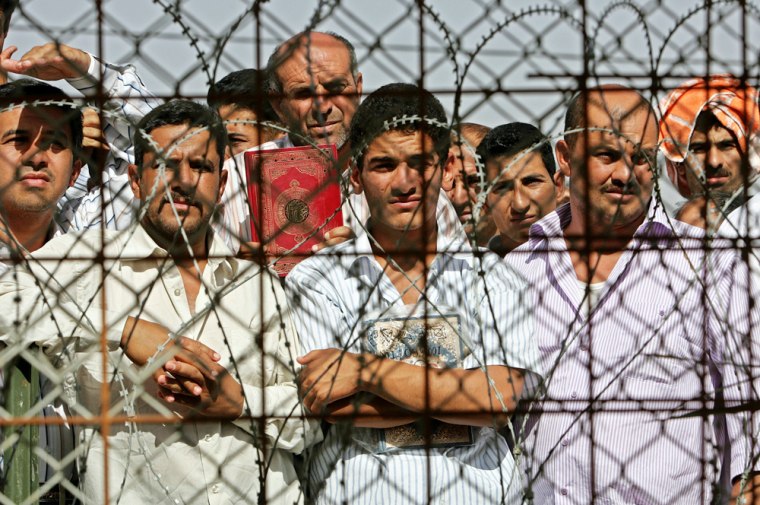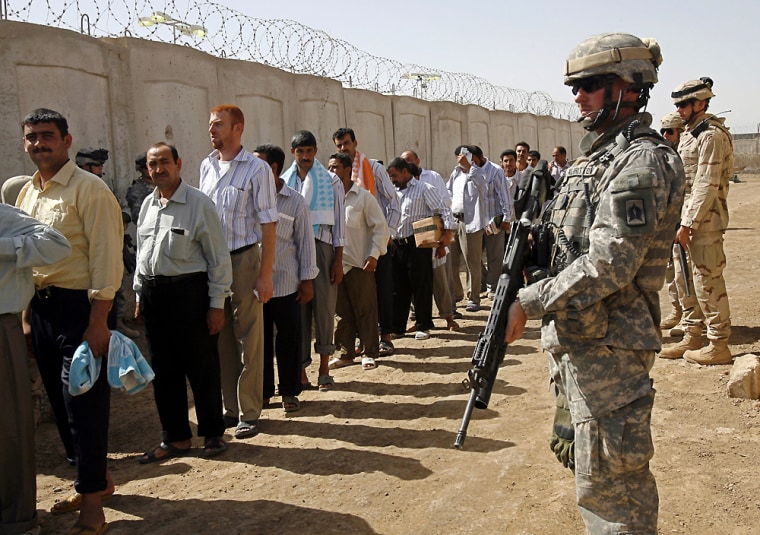Iraq's prison system is overrun with Shiite Muslim militiamen who have freed fellow militia members convicted of major crimes and executed Sunni Arab inmates, the country's deputy justice minister said in an interview this week.
"We cannot control the prisons. It's as simple as that," said the deputy minister, Pusho Ibrahim Ali Daza Yei, an ethnic Kurd. "Our jails are infiltrated by the militias from top to bottom, from Basra to Baghdad."
As a result, Yei has asked U.S. authorities to suspend plans to transfer prisons and detainees from American to Iraqi control. "Our ministry is unprepared at this time to take over the facilities, especially those in areas where Shiite militias exist," he said in a letter to U.S. Army Maj. Gen. John D. Gardner, the official in charge of American detention facilities.
Transfer plan meets resistance
U.S. officials said months ago that they planned to turn over Baghdad's Abu Ghraib prison and three other American-run facilities to the Iraqi government, but the handoff has been repeatedly pushed back. Gardner has said he will not authorize the transfers until he is convinced that standards of inmate treatment and security match those maintained in U.S.-run facilities.
"We will not transfer the facilities and legal custody of the detainees until each respective facility and the Iraqi Corrections system have demonstrated the ability to maintain the required standards, especially in the areas of care and custody," Gardner said in a written response to questions. "We fully recognize that there are significant challenges that must be overcome but believe that we will be able to address these as we move through 2006 into 2007."
He said Abu Ghraib would be transferred to Iraqi control "in the next few months."
Gardner said the eventual transfer of prisons to Iraqi control would proceed gradually, preceded by several weeks of training for Iraqi guards, conducted by U.S. corrections officers and military police. The Iraqis would then work under the supervision of American guards for at least six months. A U.S. transition team would then be left in place for an additional period before the prison was handed over.
While allegations of abuse at U.S.-run prisons have waned since the 2004 Abu Ghraib prisoner abuse scandal, Iraqi facilities have drawn increased scrutiny since a U.S. Army raid exposed torture of dozens of detainees -- most of them Sunnis -- at a secret Interior Ministry facility in the Baghdad neighborhood of Jadriyah.

The prison was widely alleged to have been operated by a special police unit staffed largely by members of the Badr Organization, a Shiite militia with ties to Iraq's largest Shiite political party. The government investigated the facility but never announced the results.
Yei said that because of mounting concern over detention centers run by Iraq's Interior and Defense ministries, where militias retain heavy influence, the police and army have agreed to turn over all their prisoners to the Justice Ministry by the end of the month.
As of early June, there were 7,426 housed in Justice Ministry facilities, Yei said. The Interior Ministry has an additional 1,797 prisoners and the Defense Ministry a smaller number. More than 15,000 inmates were being held in five U.S. prisons in Iraq.
Sunnis allege abuse
But while a U.N. human rights report issued last month stressed that the Defense and Interior ministries have legal authority to hold inmates only a brief time, Sunni Arabs charge that Sunnis are regularly imprisoned in the centers for months or even more than a year.
"The police are not supposed to be holding them beyond the time it takes to conduct an investigation," Yei said. "As long as the Interior Ministry doesn't hide anything, they will all be handed to us this month."
Already, the transfer plan is meeting resistance. The provincial council in Wasit province, south of Baghdad, ordered police there not to transfer detainees to a Justice Ministry facility, according to Muhammed Hasan al-Attabi, a provincial government spokesman.
A major general with Iraq's Interior Ministry, speaking on condition he not be named, said the transfer was already underway and would be completed on schedule. He denied that militias ran roughshod over the prisons. "All the detention centers in Baghdad and southern Iraq are under our control, except for some centers in Basra, maybe two or three there, which are run by militia officers," he said.
Signs of mistreatment
In an interview this week, Deputy Prime Minister Salam al-Zobaie, the top Sunni Arab in Iraq's new government, showed photographs taken from one recent inspection of an Interior Ministry detention center. An inmate in one of the photos held out his misshapen, limp hands for the camera. The man's hands had been broken in a beating, Zobaie said. Other inmates showed massive, dark bruises on their skin; one bore a large, open infected sore.
Inmates in another photo clustered around chains hung from the middle of one of the crowded cells. The chains were used to hoist prisoners by their bound hands, Zobaie said. The practice, noted frequently in inspection reports of Interior Ministry detention centers, often results in the dislocation of prisoners' shoulders.
Militias seen pulling the strings
Ninety percent of the men crowded into Interior Ministry detention centers are Sunni Arabs, Zobaie said. He called treatment in the Interior Ministry prisons "inhumane" and indicated it still was less than certain whether the Defense and Interior ministries would follow through on their agreement to turn over the inmates to the Justice Ministry. "Hopefully, they will," he said.
Yei gave several detailed accounts of abuses by militias, the names of which he declined to provide, saying only that "there are two, everyone knows them." U.S. officials recently said they consider the militias to be as grave a threat to Iraq's security as the Sunni-led insurgency.
On Aug. 13, 2004, he said, militia members freed 552 prisoners in the southern city of Hilla during a militia-led attack. A week later, 122 escaped from the main prison in Amarah, also in the south, with the help of guards who were also militia members.
On Jan. 13, 2005, he said, 38 prisoners escaped during an attack on a convoy carrying them to Baghdad's Abu Ghraib. Eight were eventually rearrested. A month later, seven prisoners escaped while being transferred to the Badoush prison in the northern city of Mosul.
On June 14, 2005, seven prisoners escaped from Abu Ghraib in an incident still under investigation.
Revolving-door policy
Last December, militia members entered the maximum-security prison in the Kadhimiyah section of Baghdad, a mostly Shiite neighborhood, freeing one militia member on death row and four others serving life sentences. At the same prison, on Feb. 28, guards and militia members freed two men who were to be executed that week.
And in the once-tranquil southern city of Basra, where militia violence has surged in recent months to the point that the Iraqi government declared a state of emergency in late May, militia members in early March took 12 foreign-born prisoners -- Egyptian, Saudi and Sudanese -- from their cells and shot them dead them by the facilities' main gate.
Yei's account adds to a growing list of alleged abuse in Iraq's overburdened prison system, long criticized by Sunni leaders who say Sunni prisoners are commonly mistreated.
Visits to detention centers in southern Iraq in recent months indicated they are often badly overcrowded and unsanitary. At the Tesfirat prison in Najaf last October, 122 prisoners were packed into cells designed for a maximum of 60, according to Lt. Jassim Juwad , the prison officer in charge. A prison maintained by police commandos in Hilla and designed for 150 inmates housed 400 as recently as April. Inmates at both locations had been incarcerated for up to 18 months without trial.
‘They are the government’
On Saturday, a group of parliament members paid a surprise visit to a detention facility, run by the Interior Ministry in Baqubah, north of Baghdad. "We have found terrible violations of the law," said Muhammed al-Dayni, a Sunni parliament member who said as many as 120 detainees were packed into a 35-by-20-foot cell. "They told us that they've been raped," Dayni said. "Their families were called in and tortured to force the detainees to testify against other people."
"The detention facilities of the ministries of Defense and Interior are places for the most brutal human rights abuse," he added.
But amid broad U.S. efforts to encourage the Iraqi government to improve conditions in prisons, the problem of militia control could prove particularly intractable. Shiite militias such as the Badr Organization and the Mahdi Army, loyal to cleric Moqtada al-Sadr, are backed by dozens of members of parliament whose political parties run the armed groups.
"You can't even talk to the militias, because they are the government," Yei said. "They have ministers on their side."
